China’s highly anticipated military parade commemorating the 70th anniversary of Japanese surrender in World War II was successfully held on September 3 in Beijing, with a perfectly blue and clear sky as its background. The event was a rousing success because it achieved precisely what the Chinese government wanted it to achieve from its own perspective. This is true even though international observers and some countries might have certain concerns. The major achievements for the Chinese government include the following:
First and foremost, the successful military parade, once again, shows that Xi Jinping is the undisputed leader in China. He firmly controls China’s powerful military, despite some recent speculations that his position has been weakened by a struggling stock market and slowing economy. Other former state leaders also appeared alongside Xi, including Jiang Zemin and Hu Jintao, but the message is very clear that Xi is in firm control today. This is particularly important because Xi will push for some serious organizational reforms within the PLA in the near future, thus making the PLA a truly modern military that is capable of defending China’s national interests.
Second, another important internal achievement is the overwhelmingly positive attitudes displayed toward the military parade by ordinary Chinese people. While some might interpret this strong support as evidence of an increasingly assertive Chinese nationalism, a better interpretation is that most Chinese people have found lost national pride and dignity in the military parade. They now feel that China is no longer a weak country like it was 100 years ago. China can proudly claim to be one of the major powers in the world. The days of “national humiliation” are long gone and China finally is gaining back the glory it once enjoyed hundreds of years ago. The military parade, from this perspective, is a moment of national triumph for ordinary Chinese.
Third, there is also an external message in the big military parade. As many military analysts have rightly pointed out, China’s display of advanced missiles, including a series of DF missiles, is a clear and strong signal that China now possesses a full range of advanced systems to destroy a potential enemy’s valuable targets. There should be no mistake: China still lags far behind the U.S. in terms of military hardware, but the gap is shrinking quickly in China’s favor. As I have argued before, China’s military is already a modern military and can fight a modern war, despite all the problems existing in its organization, training, and so on. In the near future, China’s military could very well become the only true competitor to the U.S. military, thus making competition between the two great powers even more fierce.
Fourth, and somewhat surprisingly, the military parade has actually reduced some countries’ suspicions of China’s future intentions, especially when Xi Jinping made the surprising announcement that China would cut its troops by 300,000. This benign gesture is a further piece of evidence that China’s military advancements do not pose a threat to other countries in Asia and even the United States. The Chinese leadership sees the country’s rise as one that can only be achieved through peaceful means. There is no other way. Cutting 300,000 troops is a smart way to send a reassurance message to other Asian neighbors, with the hope that this gesture will be reciprocated by them.
Finally, although major Western powers refused to send their presidents and prime ministers to Beijing’s parade, there is still positive support for China’s military show from Russia and South Korea, two very important regional powers. It’s particularly interesting that South Korea’s President Park Geun-hye attended, because this signals a further warming of China-South Korea relations. There was even some talk about a potential China-South Korea alliance in the future. Of course, such talk is premature at the moment, but the fact that some serious observers of regional politics are entertaining this idea is itself a significant development in China-South Korea ties.
Of course, there were some usual external criticisms of China’s big military parade, such as the bullying mentality behind the parade and muscle flexing tendencies of an assertive China. These, of course, are not new concerns. There is no way that China could avoid these perceptions as it continues to advance its military power. What we can hope for, however, is a broader dialogue between China and its rivals and, most importantly, self-restraint by all sides when it comes to difficult and deep differences.

































